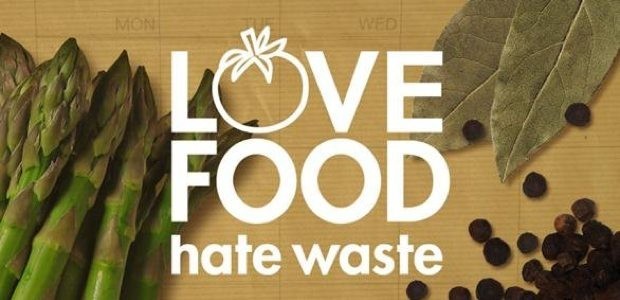
Love Food Hate Waste is a campaign headed by UK food waste advocate Emma Marsh (Image: LoveFoodHateWaste)
Being a farmer’s daughter has made me a particularly passionate advocate for food waste in the UK. Seeing firsthand the effort and resources that go into getting food to our tables has caused me to just get angry, and sad, when I see it going needlessly to waste.
I’ve have been working on the United Kingdom’s Love Food Hate Waste (LFHW) campaign since 2007, and while we’ve made great strides, leading the way globally even, there’s still a long way to go. In 2014, the UK reduced its food waste by 21%, as compared to 2007 figures. We know this from our groundbreaking research – looking at what people say they throw away (through surveys and diaries) and what they actually throw away (what’s in the bin).
It’s amazing the amount of people who confidently claim they don’t waste anything – yet by the end of our conversation, they’re confiding in me about the last of the loaf of bread that regularly ends up in the bin and the leftovers from meals that get scrapped down the toilet!
I first got involved with WRAP (Waste Reduction Always Pays, the charity behind LFHW) after taking a year out after university to volunteer with a number of environmental charities. My first job with them was in the Local Authority recycling funding team, but when they began to look at food waste in the UK in 2006, I threw myself into the program. A few years later I was lucky enough to take over running the national campaign, and I haven’t looked back!
Collective Food Waste Denial
The notion of ‘wasting’ food is loaded with guilt. For example, we can’t imagine tossing a whole bag of lettuce, a whole loaf of bread, a whole package of pork chops, etc. But… what about the end of the loaf, the last couple of wrinkly tomato es, and the last third of that bag of lettuce? These things don’t seem to count as ‘waste.’ So what is it?
es, and the last third of that bag of lettuce? These things don’t seem to count as ‘waste.’ So what is it?
It’s seen as inevitable, something that’s out of our control, and therefore, we feel less guilty and don’t classify it as being wasteful. I was exactly the same! I threw away apples (the ones left in the fruit bowl that were forgotten and browned), bread (the last half that went moldy), milk (I bought too much, just in case), and containers of cream (that sat too long in the fridge and soured). What didn’t go down the drain was thrown onto the compost heap.
But those bits of food that we forget about and end up trashing do matter – and matter a lot. After all, if there are sixteen of us in an office and each person wastes one slice of bread today, that’s a whole loaf. How many offices, in how many towns, in how many countries are wasting bread collectively? In the UK alone, we throw away the equivalent of 24 million slices of bread every single day.
Putting a Value on Wasted Food in the UK
On top of not recognizing that this food is going to waste in our homes, we’re also not realizing the value of this waste. For the average person in the UK, that’s £200 a year of good food and drink we’re spending time shopping for and then throwing straight into the bin. For the average household, that’s £470 – rising to £700 for a family with children.
Of course, the environmental impact is huge, too. While many people think that food in landfills is fine because it composts down, the opposite is true. Never mind all of the time, energy, land, water, and resources that have gone into getting the food to us! If, in the UK, we stopped throwing away perfectly edible food, it would have the same environmental impact as taking one out of every four cars off the road – no small thing! (Editor’s Note: Food degrades in a landfill into methane, which is 23 times as potent a greenhouse gas as carbon dioxide.)
Making a Real Difference in Reducing Food Waste in the UK
Right now we’re taking the Love Food Hate Waste campaign to ‘10 cities’ in the UK, building on the success of our West London campaign where food waste was reduced by 15% in just 6 months. We’ll be working alongside communities, local government and major retailers to maximize our impact. At Love Food Hate Waste, we think there’s incredible potential for all of us to work together – governments, businesses, communities and individuals – to halve avoidable food waste by 2025.
For me, I think it’s all about finding the right thing for us personally. The best route to a solution is first realising you waste food. I started using a food waste diary for the whole house, and it really was shameful — believe me, that kick started me into action.
Small Changes Make the Difference in Preventing Food Waste
It took me some time to realize, that you only need to make small changes to how you treat food in order to prevent waste. For example, now when I buy bread, I freeze half straight away and use the frozen slices for toast. But most importantly, I no longer go shopping — my husband does. I am a terrible shopper; so now he goes, buys only what we need, and our shopping bills have been massively reduced. It’s finding what works for you, and from that point on, it’s not difficult turning that into a lifetime habit.
I’m incredibly excited about making a real difference in people’s lives – whether helping their budgets stretch further, building their skills and confidence in the kitchen, or helping them to see where their food comes from. The commitment of my team, our partners, the Love Food Hate Waste champions out there, and everyday individuals taking action truly makes me feel humbled. Maybe food waste won’t be so hard to beat with all of us tackling the problem together… small steps… big changes.
If you’d like to get involved as well and help spread the message about check out www.lovefoodhatewaste.com, @LFHW_UK, LFHW Community on Facebook, and YouTube.
Posting Guidelines – Stories published on WeHateToWaste.com are intended to prompt productive conversation about practical solutions for preventing waste. Opinions expressed are solely those of the contributors and WeHateToWaste implies no endorsement of the brands, products or organizations mentioned.




Emma – This is a great “global” addition to WHTW’s Respect Food section and resources. Thanks for sharing your story, which I hope will inspire my own students. It’s another great example of the way passionate advocates, organized campaigns, and individual actions can add up to create a movement and make real change. Keep up the good work!
Thank you for your creative ways to help reduce food waste!Your article reminds me of a company that two of my fellow classmates here at Georgetown University started called Misfit Juicery. The company helps fight food waste by taking cosmetically defective fruits, that supermarkets normally throw away,and turning them into a variety of juices. Food waste is such a big problem, but there are also many solutions!
This is such an important issue in today’s culture of consumption. We have such a high level of detachment not only from where our food is sourced, but also from where it ends up. Your research is also very telling – people are not honest about their habits, and this blinds the issue as a whole. Thank you for all of your work!